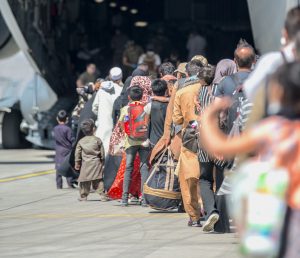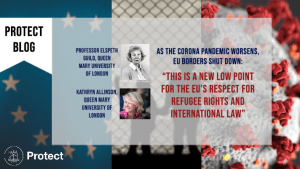By Prof Elspeth Guild, Queen Mary University of London and Kathryn Allinson, Research Assistant, Queen Mary University of London and Teaching Associate, University of Bristol.
 The spectre of the Covid19 pandemic has stalked political leaders, at local, regional, national and European levels since mid-January 2020. In amongst the myriad responses that States have taken to combat the spread of the virus those relating to refugee protection make grim viewing. The scenes at the Turkish Greek land border where the President of the Commission, the President of the European Council, the EU High Representative of the Union for Foreign Affairs were present to witness, and applaud, the violent actions of the Greek border guards and military in preventing people seeking to cross from Turkey to the EU to seek protection is exemplary of the approach of many States. And it did not help the image of the EU in these exceptional times, as a place where refugees are welcome and provide protection in accordance with international law.
The spectre of the Covid19 pandemic has stalked political leaders, at local, regional, national and European levels since mid-January 2020. In amongst the myriad responses that States have taken to combat the spread of the virus those relating to refugee protection make grim viewing. The scenes at the Turkish Greek land border where the President of the Commission, the President of the European Council, the EU High Representative of the Union for Foreign Affairs were present to witness, and applaud, the violent actions of the Greek border guards and military in preventing people seeking to cross from Turkey to the EU to seek protection is exemplary of the approach of many States. And it did not help the image of the EU in these exceptional times, as a place where refugees are welcome and provide protection in accordance with international law.
This unedifying political spectacle addressed towards the Turkish President and intended as a response to his responsibilities came at a most problematic time. EU states were within a week of closing internal and external borders to movement of persons with little regard to the needs of refugees. In this blog we will examine the subsequent efforts of the EU (and associated countries including the UK) to comply with their obligations under the 1951 Refugee Convention, in particular, as regards the processing of asylum applications. (more…)




